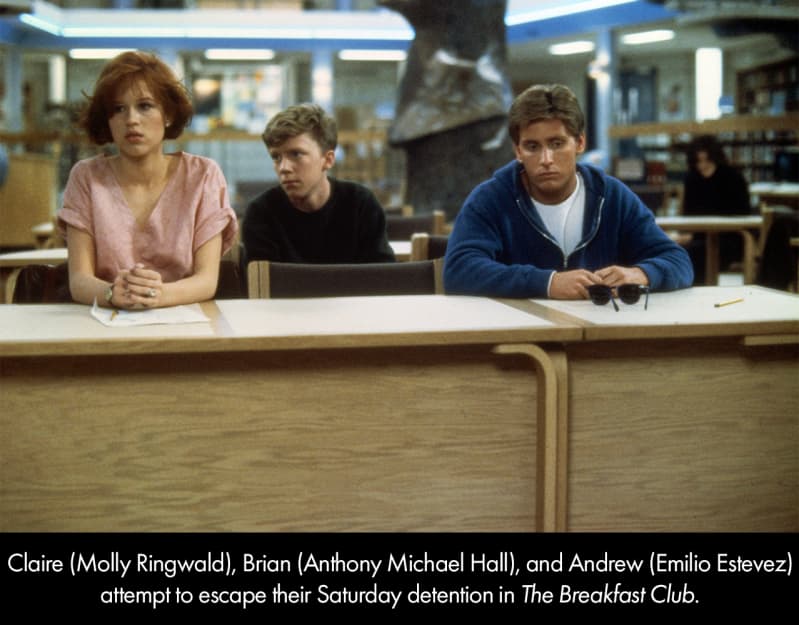While writing Exception to the Rule, Dave Harris both drew inspiration from and paid homage to many theatrical devices and pre-existing works.
Please note this article contains spoilers and may best be enjoyed following your engagement with the show.
Jump to:
Samuel Beckett’s world-renowned play Waiting for Godot influences one of the major structural elements of Exception to the Rule. Just as the students in Exception to the Rule wait for the mysterious Mr. Bernie in detention, so too the main characters of Waiting for Godot—Vladimir and Estragon—wait the entire play for the mysterious Godot to arrive. The characters in both plays are brought together by the eternal wait for the missing character, and both plays’ plots illustrate what can happen in that waiting.
Waiting for Godot is one of the most produced plays in the world, in part because the deceivingly straight-forward premise can be personalized to reflect the social and political climate of where the play is produced. Since it was first written, many writers have used the play as inspiration for their original works. Pieces like Rosencrantz and Guildenstern Are Dead by Tom Stoppard and Pass Over by Antoinette Chinonye Nwandu build on the themes, characters, and motifs of Beckett’s most famous work to say something specific about the topic they want to explore. Its basic structure is easily adaptable because of its universality, which makes it a very popular well from which to draw. According to Sir Peter Hall, who directed the British premiere of Waiting for Godot at the Arts Theatre in 1955, Godot “can be anything you want. Godot's a metaphor for religions, philosophy, belief, every kind of thing you can think of, but it never arrives.”
MAGICAL REALISM
Magical Realism rose to prominence in postcolonial Latin American literature. Gabriel García Márquez and Isabel Allende were among the first authors to popularize the genre. In a magical realist text, fantastical, other-worldly elements are woven into an otherwise grounded narrative. This juxtaposition of real and unreal often aims to capture the feeling of dissonance that can occur when large-scale political upheaval sends ripples of absurdity into everyday life. The first two-thirds of Exception to the Rule appear to be realism—but when the characters attempt to escape the classroom, supernatural elements creep in.
The anonymous voice that crackles over the intercom holds a lot of power in Exception to the Rule, and yet, the character never appears onstage in the flesh. Powerful off-stage characters are common devices in dystopian works of theatre. In Duncan Macmillan and Robert Icke’s stage adaptation of George Orwell’s novel 1984, Big Brother is the all-powerful character that never materializes—and yet, the world of 1984 is stuck under his spell. Throughout the show, Big Brother periodically appears on a screen to remind the characters that, even if they can’t see him, he is always watching. Likewise, in Exception to the Rule, the entrenched fear of the students stems largely from the fact they are under constant surveillance by the abstract “powers that be” at the school.
A sure way to create narrative tension? Put a bunch of strangers in a room and lock the door behind them. In the 1985 John Hughes film The Breakfast Club, five students from different cliques—self-identified respectively as the Nerd, the Beauty, the Jock, the Rebel, and the Recluse—bond during their mandated Saturday detention. The film paints detention as the ultimate equalizer, a place where all kinds of students can discard their differences and discover their commonalities. While The Breakfast Club wasn't one of Harris's primary inspirations for Exception to the Rule, it still serves as a useful cultural reference for positioning the play's structure.
French philosopher Jean-Paul Sartre’s 1944 existentialist play Huis Clos (titled No Exit in English) similarly imprisons its characters. In Sartre’s play, three damned souls find themselves in a limbo room post-death, and slowly come to realize that they are stuck there indeterminately as each other’s torturers. At a pivotal moment of the play, one of the souls, Joseph Garcin, is presented with a means of escape but is unable to leave.
Harris’s Exception to the Rule, then, both follows and breaks the models of The Breakfast Club and Huis Clos. Only “College Bound Erika” is new to detention and estranged from the rest of the group, while all of the other characters already know each other. As in Huis Clos, the students disclose the “crimes” that landed them in detention, and their attempts to escape have mixed results.
References
| Hanson, Matt. “The Staying Power of Sartre's No Exit.” The American Interest, 18 Oct. 2019. LeClair, Thomas. “'The Language Must Not Sweat'.” The New Republic, 21 Mar. 1981. Norris, Matt. “The Breakfast Club.” CINEMABLEND, CINEMABLEND, 8 Oct. 2018. Smith, David. “David Smith on Why Samuel Beckett's Waiting for Godot Still Matters More than 50 Years On.” The Guardian, Guardian News and Media, 8 Mar. 2009. Stasio, Marilyn. “Broadway Review: '1984' Starring Olivia Wilde.” Variety, 23 June 2017. |



